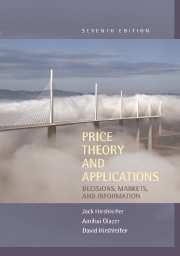Book contents
- Frontmatter
- Contents
- Preface
- PART ONE INTRODUCTION
- PART TWO PREFERENCE, CONSUMPTION, AND DEMAND
- PART THREE THE FIRM AND THE INDUSTRY
- PART FOUR FACTOR MARKETS AND INCOME DISTRIBUTION
- PART FIVE EXCHANGE
- 14 Exchange, Transaction Costs, and Money
- PART SIX ECONOMICS AND TIME
- PART SEVEN POLITICAL ECONOMY
- Answers to Selected Questions
- Name Index
- Subject Index
14 - Exchange, Transaction Costs, and Money
from PART FIVE - EXCHANGE
Published online by Cambridge University Press: 05 June 2012
- Frontmatter
- Contents
- Preface
- PART ONE INTRODUCTION
- PART TWO PREFERENCE, CONSUMPTION, AND DEMAND
- PART THREE THE FIRM AND THE INDUSTRY
- PART FOUR FACTOR MARKETS AND INCOME DISTRIBUTION
- PART FIVE EXCHANGE
- 14 Exchange, Transaction Costs, and Money
- PART SIX ECONOMICS AND TIME
- PART SEVEN POLITICAL ECONOMY
- Answers to Selected Questions
- Name Index
- Subject Index
Summary
The Fundamental Theorem of Exchange – that buyers and sellers both gain from trade – was introduced in Chapter 7. Many economic fallacies, for example, the most common arguments for protective tariffs, overlook the point that voluntary trade benefits both sides.
Still, some objections might be raised. Suppose a buyer paid good money for a beachfront lot that proves to be miles out to sea. The answer is that the parties here did not truly agree on an exchange. Owing to trickery, there was no “meeting of the minds.” Another problem: a momentary want may misrepresent a person's true preferences. Esau sold his birthright to Jacob for a mess of pottage (Genesis, Chapter 25) and regretted the transaction afterward. Third and most serious, many of us would be better off not satisfying even our most intense desires. Think of a drug addict. Getting what you wish for is often the worst thing that could happen to you. Still, it can always be said that rational participants in voluntary exchange believe they will both gain.
Mutual gain from trade involves two distinct elements. The first is an improved (mutually preferred) allocation of consumption goods. Suppose Ida and John are endowed with equal quantities of tea and coffee, but Ida prefers tea and John prefers coffee. The potential gain from trade is obvious. Alternatively, suppose Ida and John both prefer bread with butter, but Ida is initially endowed with all the bread and John with all the butter.
- Type
- Chapter
- Information
- Price Theory and ApplicationsDecisions, Markets, and Information, pp. 409 - 452Publisher: Cambridge University PressPrint publication year: 2005



